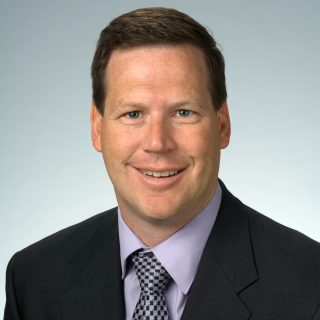
Lockheed Martin recently announced the promotion of Roy Stevens to Vice President of Global Services for its Information Systems & Global Solutions sector, having previously served as the Vice President of Strategy and Business Development A Lockheed Martin employee since 1996, WashingtonExec spoke with Stevens to see how he’s adjusting to the new job, the challenges of operating in overseas markets and cultures, and the continually-growing IT industry.
WashingtonExec: Could you tell us a little bit more about your new position and what plans you have for where you’re heading this year and beyond?
Roy Stevens: So I will be leading the global solutions line of business within IS&GS. IS&GS is one of five major areas within the corporation that accounts for about 17 percent of the corporations annual sales and I have responsibility for everything outside the U.S. within that portfolio. So of the overall piece of the pie, so there’s $7.8 billion of that IS&GS represents, and global is about 18 percent right now of that $7.8 billion.
I’m responsible for execution of the programs with their international customers and growth of the business. We have really kind of two major locations outside of the U.S., Australia and the UK, both which have upwards of 500 employees — UK is almost 1,000 employees — and then we have smaller sets of employees in Canada, Israel and the Middle East. So it’s really kind of spread across the globe.
You need to really adapt your thinking to that country, and not think, “Well, I’ve done a lot of international business, so I know how to do business internationally.” You need to know how different countries do business, what the customer values, what they need, and how they are going to interact with you contractually and then you have to adapt your processes, your people and your systems to that country’s operational styles, laws and so forth.
WashingtonExec: Where are you seeing growth in the markets, either in terms of countries or in terms of solutions, what are your customers looking for?
Roy Stevens: IS&GS is the IT portion of the corporation, we’ve been the biggest IT provider to the U.S. government for 21 years straight, and so although overall defense sales are down due to budgets, both in the U.S. and globally, the IT market is not really seeing the same thing. We see IT as a growth market, both in terms of defense and civilian government services. Places where we’re seeing the most growth in the Middle East and far east, but still very steady businesses in Australia and the UK.
WashingtonExec: What are your biggest challenges in trying to get into the new global market or foreign governments?
Roy Stevens: The biggest challenge is really that each country operates differently and so often, we think because people speak English they will operate like us and they will operate like the U.S. government does. Even in countries like the UK and Australia, who are very similar to us, their procurement systems and how they buy and what they value are totally different.
You need to really adapt your thinking to that country, and not think, “Well, I’ve done a lot of international business, so I know how to do business internationally.” You need to know how different countries do business, what the customer values, what they need, and how they are going to interact with you contractually and then you have to adapt your processes, your people and your systems to that country’s operational styles, laws and so forth.
When you operate a global business, it’s about tailoring your business to each of the sovereign nations that you’re interacting with, and that is often a mindset shift, even when you’re taking products or capabilities that you sell to your customers in the U.S. and you transport those capabilities up to other customers, you have to really ask yourself the question of, “What is it they need?” and adapt yourself.
For that reason, I kind of talked about our beach heads, in the UK and Australia, and those are really places where we are operating, rather than what we call an export model — where we take talent from the U.S., send them in, we go work and solve a problem — UK and Australia, we really have strong indigenous staffs so that we can have people that live there, work there, understand their various cultures, then they execute the programs, and we just may augment those staffs with capabilities from the U.S. Where we can do that, where there is enough work, we like to do that sovereign model, where we’re operating from the country, in the case of the UK we’re exporting from the UK out to other countries.
WashingtonExec: On that same vein, how do you make sure you’re acquiring the top talent in each of the foreign countries, even though you’re an American company? How do you find that top talent, is it different that how you find that top talent in the U.S.? What has been your experience?
Roy Stevens: It does tailor, each country is a little different. Talent in the UK, there’s a strong defense and government industries, so getting talent is not really an issue. In the UK, it is all about getting the right talent to the right portion of either England, Wales, Scotland or Northern Ireland. Talent acquisition in the UK is not really an issue. As we mature, we’ve been operating in the UK as a corporation for 60 years, and so we’ve got a strong base there, but only in the last 10 have we been led by a British citizen. So having people that work for Lockheed UK and IS&GS UK, see a path where they can grow their full careers in the UK is a key component.
We’re in the process of doing the same thing in Australia; a matter of fact, the corporation’s leader in Australia is an Australian, and I’m in the process of changing out my leadership. We’ve had an ex-Patriot, who was based here in the U.S. and has been living down there for four years, and we’re looking for a local national to lead that business for us in the future.
WashingtonExec: Anything else our readers should know?
Roy Stevens: The only additional point that I would make is that like a lot of defense and aerospace companies, Lockheed Martin sees international as a growth area. As we project out for the next three to five years, we see it growing from 18 percent of our business to 25 to 30 percent of our business. It is an investment that we’ve been doing for a long time, and we’ve been broadening our reach and that’s really my primary job, where we’re not just selling defense platforms, but we’re really looking at civilian IT jobs such as tax offices, law enforcement, large IT consolidations. We’re very bullish on the opportunities that exist outside the U.S. in our particular area of expertise.


